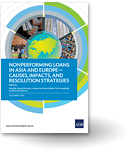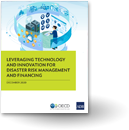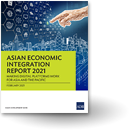Nonperforming Loans in Asia and Europe—
Causes, Impacts, and Resolution Strategies
The coronavirus disease (COVID-19) pandemic has weighed heavily on the global economy, triggering a worldwide recession in its wake. And while quick policy action in the form of liquidity support and regulatory forbearance has allayed the risk of financial crisis, the threat of an elevation in nonperforming assets across Asia and Europe remains acute.
Previous crisis episodes have illustrated the destabilizing effect a buildup in nonperforming loans can have on the real economy and the need for swift and effective mitigating policy action. As NPLs begin to pick up across parts of Asia and Europe, comprehensive policy action remains crucial.
Against this backdrop, this webinar highlighted the key findings from the edited volume prepared by the Asian Development Bank and the European Central Bank. The discussion distilled the main insights on the implications of an increase in NPLs as well as the available policy options. The lessons outlined draw from empirical analyses as well as on country and regional case studies. Among the learnings highlighted is the necessity of fostering an ecosystem conducive to NPL market development and resolution, including addressing data asymmetries, improving financial market infrastructure, and enhancing legal frameworks and judicial capacities. Specific options to NPL resolution were discussed in detail, incl. the possible role of asset management companies, securitization schemes, or electronic NPL trading platforms. While highlighting the need for country-specific approaches, the book also discusses the beneficial role regional cooperation can play to strengthen NPL resolution mechanisms.
The presentation of the book’s main findings was followed by panel discussion among policy experts, aiming to contribute to the overall discussions of enhancing financial resilience in Europe and Asia amid the COVID-19 pandemic.
Download the bookEvent details
Date/Venue:
- 4:30p.m.–6:00p.m.
(virtual | Manila)
9:30a.m.–11:00a.m.
(virtual | Frankfurt)
Monday 13 December 2021Online meeting Video Link:
-
Link to YouTube
Downloads:
Contacts:
-
- Peter Rosenkranz
Economist, Economic Research and Regional Cooperation Department,
Asian Development Bank
Email: prosenkranz@adb.org
- Paulo Rodelio Marquez. Halili
Senior Economics Officer, Economic Research and Regional Cooperation Department,
Asian Development Bank
Email: phalili@adb.org
- Marilyn Aure. Parra
Senior Operations Assistant, Economic Research and Regional Cooperation Department,
Asian Development Bank
Email: mparra@adb.org
- Peter Rosenkranz
Programme

- Host:
 Cyn-Young Park Director for Regional Cooperation and Integration, ADBBio
Cyn-Young Park Director for Regional Cooperation and Integration, ADBBioCYN-YOUNG PARK is Director of the Regional Cooperation and Integration Division in the Economics Research and Regional Cooperation Department of the Asian Development Bank (ADB). In her current capacity, she manages a team of economists to examine economic and policy issues related to regional cooperation and integration (RCI) and develops strategies and approaches to support RCI. During her progressive career within ADB, she has been a main author and contributor to ADB’s major publications including Asian Development Outlook (ADB’s flagship publication), Asian Economic Integration Report, Asia Capital Markets Monitor, Asia Economic Monitor, Asia Bond Monitor, and ADB Country Diagnostic Study Series. She has also participated in various global and regional forums including the G20 Development Working Group, Association of Southeast Asian Nations (ASEAN), ASEAN+3, Asia-Pacific Economic Cooperation (APEC), and Asia-Europe Meeting (ASEM). She has written and lectured extensively about the Asian economy and financial markets. Her work has been published in peer-reviewed academic journals including the Journal of Banking and Finance, the Journal of Financial Stability, the Journal of Futures Markets, the Review of Income and Wealth, and the World Economy.
Prior to joining ADB, she served as Economist (1999-2002) at the Organisation for Economic Co-operation and Development (OECD), where she contributed to the OECD Economic Outlook. She received her PhD in Economics from Columbia University. She holds a bachelor’s degree in International Economics from Seoul National University.
16:30–16:35 Opening Remarks: Bambang Susantono Vice-President for Knowledge Management and Sustainable Development, Asian Development Bank (ADB)Bio Slides
Bambang Susantono Vice-President for Knowledge Management and Sustainable Development, Asian Development Bank (ADB)Bio SlidesBAMBANG SUSANTONO is the Vice-President for Knowledge Management and Sustainable Development of the Asian Development Bank (ADB). Distinguished in providing global thought leadership on sustainable development, he actively conducts research, publishes several books, and writes articles in the subject of infrastructure, transportation, urban and regional planning, and climate change.
He holds a PhD in Infrastructure Planning, and two Master’s degrees in Transportation Engineering, and City and Regional Planning from the University of California, Berkeley. He has a Bachelor’s degree in Engineering from Civil Engineering Department, the Bandung Institute of Technology.
Dr. Susantono is responsible for managing knowledge in ADB and coordinating research and studies on various topics such as energy, transport, water, education, health, finance, digital technology, urban; and cross-cutting nexus themes such as climate change, environment, governance, gender equality, social development, rural development and food security, and regional cooperation. He also coordinates ADB annual flagship publications such as the Asian Development Outlook, Key Indicators of Asia Pacific, and Asian Regional Economic Integration Report.
Prior to this, Dr. Susantono was the Acting Minister, and Vice-Minister of Transportation of Indonesia, and Deputy Minister for Infrastructure and Regional Development at the Office of Coordinating Ministry for Economic Affairs. He was also Member of the Board for airline, port, telecommunications, and media companies. He chaired several research institutes and taught in universities.
16:35–16:40 Welcoming Remarks: John Fell Deputy Director General for Macroprudential Policy and Financial Stability, European Central Bank (ECB)Bio
John Fell Deputy Director General for Macroprudential Policy and Financial Stability, European Central Bank (ECB)BioJOHN FELL is Deputy Director General for Macroprudential Policy and Financial Stability in the ECB. He is also the chair or co-chair of several international working groups—including the Eurosystem’s Macroprudential Policy Group (MPPG), the European Systemic Risk Board’s (ESRB) Instrument Working Group (IWG), and the ESRB’s task force on stress-testing. He is a member of the ECB’s Financial Stability Committee (FSC), the ESRB’s Advisory Technical Committee (ATC), and the Financial Stability Board’s Standing Committee on Assessing Vulnerabilities (SCAV). He led the stress-testing work for the ECB’s “comprehensive assessment” in 2014 as well as EU-wide banking sector stress-tests coordinated by the Committee of European Banking Supervisors (CEBS) (2009, 2010) and the European Banking Authority (EBA) (2011, 2014). His crisis management experience is extensive, including negotiating EU/IMF financial assistance programs in several euro area countries (e.g., in Ireland, Portugal and Spain). Between 2003 and 2010, he was Head of the ECB’s Financial Stability Division, spearheading the inaugural issue of the ECB’s Financial Stability Review in 2004 and directing it thereafter. Before moving to the financial stability area in 2003, he was an Adviser in the ECB’s Monetary Policy Directorate. Prior to joining the ECB in 1998, as a principal economist, he held various positions at the European Monetary Institute (EMI) and the Central Bank of Ireland. John holds postgraduate degrees in Economics (1987) and in Finance (1993) from University College Dublin and Dublin City University, respectively, and is a PhD candidate at the Rotterdam School of Management, Erasmus University. He has published his research in several academic and policy journals.
16:40–16:55 Joint Presentation of Book’s Key Findings Peter Rosenkranz Economist, ADBBio
Peter Rosenkranz Economist, ADBBioPETER ROSENKRANZ is an Economist in the Regional Cooperation and Integration Division in the Economics Research and Regional Cooperation Department of the Asian Development Bank (ADB). His knowledge work focuses on financial development and stability within the context of regional financial integration and cooperation in Asia. Recent work includes research on macrofinancial implications of nonperforming loans (NPLs) and policy options for NPL resolution, US dollar funding conditions, regional financial safety nets, and FinTech. He further supports ADB’s participation in regional policy forums, such as ASEAN, ASEAN+3, APEC, and ASEM.
He held prior positions at the Deutsche Gesellschaft für Internationale Zusammenarbeit (GIZ) as an Advisor on economic and development policy, and the European Central Bank (ECB) as a Market Infrastructure Expert. He holds a PhD in Economics from the University of Zurich, Switzerland; and his Master’s and Bachelor’s degrees in Economics from the University of Konstanz, Germany. Reiner Martin Lead Economist, Joint Vienna InstituteBio
Reiner Martin Lead Economist, Joint Vienna InstituteBioREINER MARTIN is Lead Economist at the Joint Vienna Institute in Vienna, Austria, where he is developing and delivering a range of financial sector training courses, e.g., on NPL management and resolution, macroprudential policy, stress testing, bank restructuring and resolution, and risk-based supervision. In addition, he is involved in technical assistance work for the Asian Development Bank, the IMF, and the World Bank and conducts related research.
Until August 2018 he was Deputy Head of the European Central Bank’s Macroprudential Policy Division, responsible for assessing financial stability and macroprudential policy in the euro area. In addition, he was closely involved in developing resolution strategies for non-performing loans.
Prior to this, he was Deputy Head of the ECB’s Stress Testing Division and was heading the ECB financial sector teams for Cyprus, Spain, and Slovenia.
From 2008 to 2010, he was Research Advisor at the Oesterreichische Nationalbank (Austrian Central Bank), coordinating and conducting research on economic and financial developments in emerging Europe and other emerging market regions.
Earlier he was heading the ECB’s Convergence Section, responsible for analyzing economic and financial developments in Central, Eastern and Southeastern Europe (CESEE) and leading ECB work on the expansion of the euro area.
Reiner Martin holds a PhD in Economics from the University of Hamburg (Germany) and Master degrees in Economics and Political Science from the Universities of Sussex and Bristol (UK).
 Maciej Grodzicki Adviser, ECBBio
Maciej Grodzicki Adviser, ECBBioMACIEJ GRODZICKI is an Adviser in the Systemic Risk and Financial Institutions Division of the European Central Bank (ECB). He works extensively on issues in the euro area banking sector, including asset quality, bank profitability and consolidation, and calibration of capital buffers for systemically important banks. He has been actively contributing to the European debate on the resolution of nonperforming bank assets. Previously, he was involved in several European Union-wide stress testing exercises, the 2014 ECB comprehensive assessment, and economic adjustment programs in Cyprus and Portugal. Prior to joining the ECB in 2010, Maciej worked for 4 years at the National Bank of Poland.
16:55–17:45 Panel Discussion:Theme: Navigating COVID-19 Recovery: How to Manage NPLs amid Policy Normalization?Moderator: Cyn-Young Park Director for Regional Cooperation and Integration, ADBBio
Cyn-Young Park Director for Regional Cooperation and Integration, ADBBioCYN-YOUNG PARK is Director of the Regional Cooperation and Integration Division in the Economics Research and Regional Cooperation Department of the Asian Development Bank (ADB). In her current capacity, she manages a team of economists to examine economic and policy issues related to regional cooperation and integration (RCI) and develops strategies and approaches to support RCI. During her progressive career within ADB, she has been a main author and contributor to ADB’s major publications including Asian Development Outlook (ADB’s flagship publication), Asian Economic Integration Report, Asia Capital Markets Monitor, Asia Economic Monitor, Asia Bond Monitor, and ADB Country Diagnostic Study Series. She has also participated in various global and regional forums including the G20 Development Working Group, Association of Southeast Asian Nations (ASEAN), ASEAN+3, Asia-Pacific Economic Cooperation (APEC), and Asia-Europe Meeting (ASEM). She has written and lectured extensively about the Asian economy and financial markets. Her work has been published in peer-reviewed academic journals including the Journal of Banking and Finance, the Journal of Financial Stability, the Journal of Futures Markets, the Review of Income and Wealth, and the World Economy.
Prior to joining ADB, she served as Economist (1999-2002) at the Organisation for Economic Co-operation and Development (OECD), where she contributed to the OECD Economic Outlook. She received her PhD in Economics from Columbia University. She holds a bachelor’s degree in International Economics from Seoul National University.
 Chuchi Fonacier Deputy Governor, Bangko Sentral ng PilipinasBio Slides
Chuchi Fonacier Deputy Governor, Bangko Sentral ng PilipinasBio SlidesCHUCHI FONACIER is the Deputy Governor (DG) of the Financial Supervision Sector, which is mainly responsible for the regulation of banks and other BSP-Supervised Financial Institutions. She joined the BSP in 1984 as a bank examiner and worked her way to become deputy governor in 2017.
DG Fonacier is currently the Chair of the Executives’ Meeting of East Asia Pacific Central Banks Working Group on Banking Supervision, composed of central banks and supervisory authorities from 11 countries in the East Asia and the Pacific which focuses on bank supervision matters that are relevant to EMEAP WGBS members.
She has been invited as panelist/resource person in various international conferences/fora on banking supervision, financial inclusion, financial technology, bank resolution and crisis management, financial stability, shadow banking, capacity building, etc.
She also attended various foreign trainings and seminars offered by international organizations, and other central banks and supervisory authorities. She represented the BSP during the study visit on Green Finance in the United Kingdom, as well as in various fora on sustainable finance.
 Piroska Nagy-Mohacsi Visiting Professor London School of Economics, Former Director at EBRDBio Slides
Piroska Nagy-Mohacsi Visiting Professor London School of Economics, Former Director at EBRDBio SlidesPIROSKA NAGY-MOHACSI is Visiting Professor at the Firoz Lalji Institute for Africa (FLIA) at the London School of Economics and Political Science (LSE) and Partner of Macroeconomic Advisory Group, New York. Previously, Piroska was Interim Director and Programme Director of the LSE Institute for Global Affairs (2015-2021). Prior to the LSE, Piroska was Director for Policy at the European Bank for Reconstruction and Development (EBRD) (2008-2015); and worked in senior positions in the International Monetary Fund (IMF) (1986–2008). She was Senior Adviser at Fitch Ratings in 2003-2004 and Visiting Lecturer at the Hebrew University of Jerusalem in 1996–1997.
 Boštjan Jazbec Member of the Board and Director of Resolution Planning and Decisions, Single Resolution BoardBio
Boštjan Jazbec Member of the Board and Director of Resolution Planning and Decisions, Single Resolution BoardBioBOŠTJAN JAZBEC became a Board Member of the Single Resolution Board (SRB) in March 2018 and is the Director of Resolution Planning and Decisions. He is responsible for the banks under the direct remit of the SRB in 6 EU Member States, for 2 global systematically important banks (GSIBs), and for several resolution teams involved in resolution planning. He is also Chair of the Cross-Border Crisis Management Group for banks at the Financial Stability Board. From 2003 to 2008 he was Board Member of the Bank of Slovenia. After 2008, he worked as a Senior Advisor of the International Monetary Fund (IMF) at the Central Bank of Kosovo and the Central Bank of Suriname. In July 2013 he was appointed Governor of the Bank of Slovenia and the Member of the Governing Council of the ECB. From 2016 to 2018 he was a Member of the Bank for International Settlements’ (BIS) Central Bank Governance Group. He holds a PhD in Economics from the Institute for Advanced Studies in Vienna and the University of Ljubljana.
 Chinang Kong Co-Head of Principal Investments Asia, Pepper Financial Services GroupBio
Chinang Kong Co-Head of Principal Investments Asia, Pepper Financial Services GroupBioCHINANG KONG has over 19 years’ experience as senior executive banker and advisor within corporate finance specializing in financial services and M&A, and have been supporting numerous financial institutions with core/non-core strategies and execution.
He currently leads Pepper Group business and expansion in the People’s Republic of China; Hong Kong, China; and Taipei,China; and in SE Asia. Prior to joining Pepper, he led Deloitte’s Portfolio Lead Advisory Services (“PLAS”) business in Asia and advised banks, globally renowned funds and government agencies in the region. Prior to that, he was the Head of Portfolio Strategy for the Global Non-Core Division of Lloyds Banking Group (“LBG”)—one of the largest distressed banks in Europe during the Global Financial Crisis—where he was part of the senior executive team leading the successful deleveraging of LBG’s £300bn of Non-core assets.
Supporting LBG since the inception of the “Bad Bank”, he was also a member of the Group Asset Reduction Forum which is the key decision forum for LBG’s deleveraging programme and significant transactions. The Division comprised of multiple asset classes including Shipping, Aircraft, Leasing, CRE, SME, Resi, etc., across numerous international jurisdictions.
17:45–18:00 Q&ADisclaimer:
- The views expressed on this website are those of the authors and presenters and do not necessarily reflect the views and policies of the Asian Development Bank (ADB) or its Board of Governors or the governments they represent. ADB does not guarantee the accuracy of the data in any documents and materials posted in this website and accepts no responsibility for any consequence of their use. By making any designation of or reference to a particular territory or geographic area, or by using the term “country” in any documents posted in this website, ADB does not intend to make any judgments as to the legal or other status of any territory or area.


